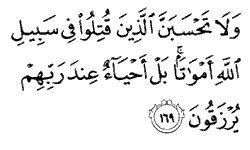Noblest Crown, Azan, Practical Discipline
Issue 838 » April 17, 2015 - Jumada Al-Thani 28, 1436
Living The Quran
Noblest Crown
Al-Imran (The House of Imran) - Chapter 3: Verse 169
 "Do not count as dead those who fall in the cause of Allah. They are alive with Allah and He provides for them."
"Do not count as dead those who fall in the cause of Allah. They are alive with Allah and He provides for them."
Islamic law has laid down a very precise code for the declaration and conduct of war. The right to declare hostilities is not in the hand of the executive authority, but in that of the courts of law, which require evidence to be furnished when aggression or injustice has been committed against the Islamic state and its citizens. It has made it illegal, i.e. punishable by court action as well as by God, to kill or destroy property wantonly, to attack clergy, women and children unless they are physically engaged in fighting on the battlefield. Above all, Islam prohibits aggression, and hence, any war entered into for self-aggrandizement, booty or power. By the same token, it commands the Muslims to lay down their lives readily when justice is violated and restoration of it demands the sacrifice. Islam teaches that the Muslim who falls in battle in a just war is ipso facto a martyr whose place in paradise is assured. Al Shahadah (martyrdom) is the highest and noblest crown that can be placed on any human life.
Compiled From:
"Al Tawhid: Its Implications for Thought and Life" - Ismail Raji al Faruqi, p. 193
Understanding The Prophet's Life
Azan
If you hear the azan, stop talking, listen to it and respond to the call of Allah. Many people, even those with Islamic knowledge, continue talking while the azan is being called. This is rude, as those hearing the azan should listen to it and stop speaking, studying and even reciting the Quran. Thoughtfully they should repeat the words of the azan and reflect on the meaning of this heavenly call.
The azan nourishes the Muslim soul with faith and nearness to Allah, so do not forego your share of it and teach this to your children and friends. Abu Said al-Khudri narrated that the Prophet (peace be upon him) said: "If you hear the azan, repeat what the muazzin is saying." [Bukhari] In another hadith reported by Jabir, the Prophet said: "He deserves my help on the Day of Judgment who says when hearing the azan: 'O Allah, the Lord of this perfect call and imminent prayer, please award Muhammad the help, virtues, and the desired status you promised him.'" [Bukhari]
Compiled From:
"Islamic Manners"- Abdul Fattah Abu Ghudda, pp. 51, 52
Blindspot!
Practical Discipline
We have become used to thinking that religion should provide us with information. Is there a God? How did the world come into being? But this is a modern preoccupation. Religion was never supposed to provide answers to questions that lay within the reach of human reason. Religion's task, closely allied to that of art, was to help us to live creatively, peacefully, and even joyously with realities for which there were no easy explanations and problems that we could not solve: mortality, pain, grief, despair, and outrage at the injustice and cruelty of life. Over the centuries people in all cultures discovered that by pushing their reasoning powers to the limit, stretching language to the end of its tether, and living as selflessly and compassionately as possible, they experienced a transcendence that enabled them to affirm their suffering with serenity and courage. Scientific rationality can tell us why we have cancer; it can even cure us of our disease. But it cannot assuage the terror, disappointment, and sorrow that come with the diagnosis, nor can it help us to die well. That is not within its competence. Religion will not work automatically, however; it requires a great deal of effort and cannot succeed if it is facile, false, idolatrous, or self-indulgent.
Religion is a practical discipline, and its insights are not derived from abstract speculation but from spiritual exercises and a dedicated lifestyle. Without such practice, it is impossible to understand the truth of its doctrines.
Socrates, Plato, and Aristotle, the founders of Western rationalism, saw no opposition between reason and the transcendent. They understood that we feel an imperative need to drive our reasoning powers to the point where they can go no further and segue into a state of unknowing that is not frustrating but a source of astonishment, awe, and contentment.
Compiled From:
"The Case for God" - Karen Armstrong, pp. 318, 319